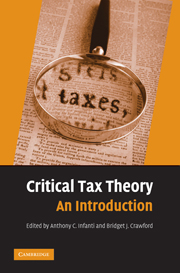Book contents
- Frontmatter
- Contents
- List of Illustrations
- List of Tables
- List of Contributors
- List of Common Abbreviations
- Introduction
- CHAPTER 1 FOUNDATIONS OF CRITICAL TAX THEORY
- CHAPTER 2 HISTORICAL PERSPECTIVES ON TAXATION
- CHAPTER 3 THE GOALS OF TAX POLICY
- CHAPTER 4 CRITICAL TAX THEORY MEETS PRACTICE
- CHAPTER 5 RACE AND TAXATION
- CHAPTER 6 GENDER AND TAXATION
- CHAPTER 7 SEXUAL ORIENTATION AND TAXATION
- CHAPTER 8 THE FAMILY AND TAXATION
- CHAPTER 9 CLASS AND TAXATION
- CHAPTER 10 DISABILITY AND TAXATION
- CHAPTER 11 GLOBAL CRITICAL PERSPECTIVES ON TAXATION
- CHAPTER 12 CRITICAL PERSPECTIVES ON CRITICAL TAX THEORY
- Index
CHAPTER 11 - GLOBAL CRITICAL PERSPECTIVES ON TAXATION
Published online by Cambridge University Press: 04 August 2010
- Frontmatter
- Contents
- List of Illustrations
- List of Tables
- List of Contributors
- List of Common Abbreviations
- Introduction
- CHAPTER 1 FOUNDATIONS OF CRITICAL TAX THEORY
- CHAPTER 2 HISTORICAL PERSPECTIVES ON TAXATION
- CHAPTER 3 THE GOALS OF TAX POLICY
- CHAPTER 4 CRITICAL TAX THEORY MEETS PRACTICE
- CHAPTER 5 RACE AND TAXATION
- CHAPTER 6 GENDER AND TAXATION
- CHAPTER 7 SEXUAL ORIENTATION AND TAXATION
- CHAPTER 8 THE FAMILY AND TAXATION
- CHAPTER 9 CLASS AND TAXATION
- CHAPTER 10 DISABILITY AND TAXATION
- CHAPTER 11 GLOBAL CRITICAL PERSPECTIVES ON TAXATION
- CHAPTER 12 CRITICAL PERSPECTIVES ON CRITICAL TAX THEORY
- Index
Summary
As previous chapters of this book evidence, critical tax perspectives are not unique to the United States. This chapter adds another dimension to the international application of critical tax perspectives by demonstrating their relevance to crossborder tax issues. The relevance of critical perspectives to cross-border tax issues should come as no surprise, because what is commonly referred toas “international tax” is not really a separate and distinct set of tax rules. Rather, it is more akin to an overlay that must be placed on top of the generally applicable rules in the Code – which have been addressed at length in all of the previous chapters of this book.
In international tax parlance, cross-border issues generally fall into one of two categories: inbound and outbound. “Inbound” refers to situations where non-U.S. persons come to (or engage in transactions in) the United States, and “outbound” refers to situations where U.S. persons go (or engage in transactions) abroad. The contributions to this chapter have been grouped together in keeping with this common division of cross-border tax issues.
The first three contributions to this chapter concern what might be termed “inbound” situations. In Toward a Global Critical Feminist Vision: Domestic Work and the Nanny Tax Debate, Taunya Lovell Banks begins with an examination of the “nanny tax” debate that followed Zoe Baird's failed nomination for U.S. Attorney General by President Clinton in 1992. Baird withdrew from consideration after it came to light that she had failed to pay Social Security taxes for her live-in child-care worker, who was an undocumented immigrant.
- Type
- Chapter
- Information
- Critical Tax TheoryAn Introduction, pp. 323 - 325Publisher: Cambridge University PressPrint publication year: 2009



